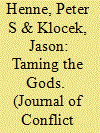| Srl | Item |
| 1 |
ID:
190884


|
|
|
|
|
| Summary/Abstract |
This article investigates how and when regime transitions intensify minority discrimination through an analysis of two types of religious persecution following the Arab uprisings. We argue that weakened institutions and the prevalence of religious outbidding during political transitions make societal-based religious discrimination (SRD) more likely to increase than government-based religious discrimination (GRD). This is because social divisions are often exacerbated and social unrest difficult to contain, while at the same time, policy change can be difficult to enact and enforce. We test these claims through a mixed-methods research design. Employing a synthetic control method, the cross-national, quantitative analysis from 1990 to 2014 confirms that GRD has not changed since the Arab uprisings, while SRD has substantially increased in those countries (i.e. Egypt, Libya, and Tunisia) that also experienced regime change. A case study of Egypt provides more direct evidence of the institutional and outbidding mechanisms. The qualitative analysis draws on ethnographic research conducted in Cairo during 2014, which includes in-depth interviews with Coptic Orthodox Christians. Our findings underscore the twin challenge of protecting and accommodating minority religions during periods of political transition.
|
|
|
|
|
|
|
|
|
|
|
|
|
|
|
|
| 2 |
ID:
163438


|
|
|
|
|
| Summary/Abstract |
Despite a robust literature on general forms of state repression, the determinants of religious repression remain unclear. This article argues that a regime’s experience with religious conflict will lead it to be more repressive of religious groups within its territory for three primary reasons. Religious conflict increases the behavioral threat posed by religious groups, lowers the cost of repressing these communities, and evokes vivid memories of past religious violence that underscore the role of the state in taming religion to maintain social order. New, cross-national data on religious conflict and repression from 1990 to 2009 show that religious conflict has a significant and positive effect on the level of religious repression for the time period under investigation, expanding the types and severity of government restrictions on religion in a country. Our findings point to the importance of studying the causes and nature of negative sanctions against religious communities, specifically.
|
|
|
|
|
|
|
|
|
|
|
|
|
|
|
|